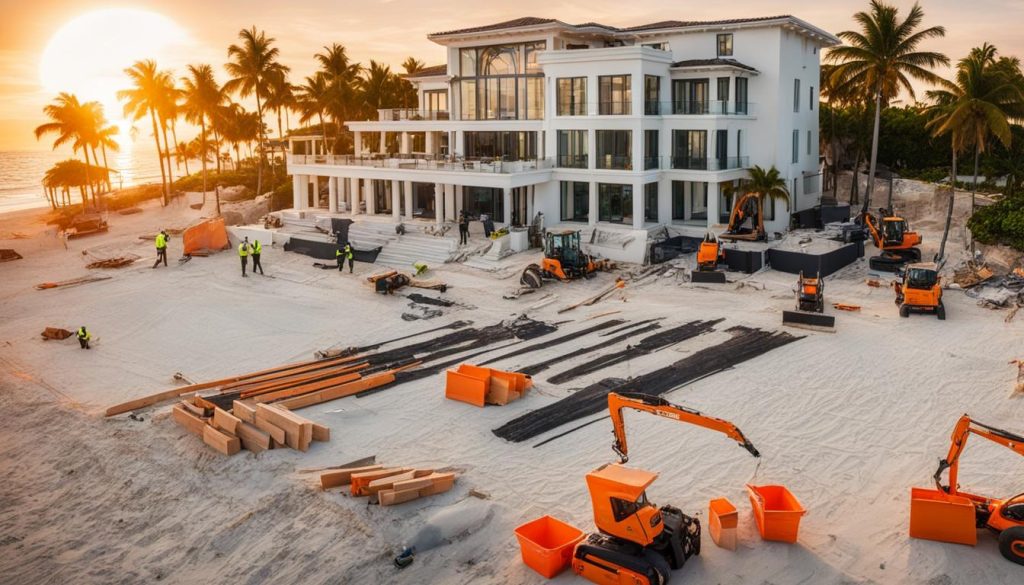Are you interested in flipping houses in the bustling Miami real estate market? With its incredible weather, diverse population, and high demand for rental properties, Miami offers a unique opportunity for real estate investment. However, with so many options available, it can be challenging to navigate this competitive industry successfully.
That’s why we’ve put together this comprehensive guide on flipping Miami real estate. Whether you’re a seasoned investor or a first-timer, this guide will provide you with valuable insights into the Miami real estate market and profitable tips to get started.
In this guide, we’ll cover everything from understanding the Miami real estate market to researching potential investment properties, financing your ventures, and building a reliable network of professionals.
We’ll also discuss calculating costs and creating budgets, renovating for maximum return on investment, navigating the permitting and compliance processes, pricing and marketing for a quick sale, and managing the flip to overcome challenges.
If you’re ready to dive into the exciting world of Miami real estate investing, keep reading! Our expert tips will help you achieve success in flipping Miami real estate.
Understanding the Miami Real Estate Market
If you’re interested in Miami property investment, it’s crucial to have a clear understanding of the Miami real estate market. With its warm climate, beautiful beaches, and vibrant culture, Miami is a prime location for real estate investment.
The Miami real estate market is constantly evolving, with market trends and conditions that can affect your investment strategy. Some key neighborhoods in Miami for house flipping include Brickell, Edgewater, and Coconut Grove. To make a smart investment, it’s essential to evaluate factors such as property location, price, and potential for value appreciation.
According to recent data, the Miami real estate market has remained strong despite the pandemic, with an increase in both closed sales and median prices. With low-interest rates and a high demand for properties, now may be an opportune time to invest in Miami real estate.
Market Analysis
| Year | Closed Sales | Median Price |
|---|---|---|
| 2018 | 46,946 | $355,000 |
| 2019 | 44,902 | $370,000 |
| 2020 | 50,158 | $399,900 |
Note: Data sourced from Miami Association of Realtors
The above table provides a snapshot of closed sales and median prices in the Miami real estate market between 2018 and 2020. As you can see, both closed sales and median prices have steadily increased over the past few years, indicating a robust market.
However, investing in Miami real estate also comes with risks. It’s important to stay informed about market conditions, conduct thorough research, and consult with industry professionals such as real estate agents and property inspectors. By understanding the Miami real estate market, you can make informed decisions in your investment journey.
Researching Potential Investment Properties
Flipping houses in Miami can be a lucrative investment opportunity, but it requires careful research and consideration when identifying potential properties. The first step is to define your investment criteria. Consider what type of property you’re looking for, the desired location, your budget, and the potential return on investment.
Location is a critical factor when searching for investment properties. Studying the Miami real estate market trends can provide valuable insights into the most desirable neighborhoods to target. Areas with a history of high appreciation rates and low crime rates are likely to offer better opportunities for your investment.
Property Condition
When assessing properties, evaluate their condition and determine which repairs are necessary. It’s essential to know what updates and repairs are required to assess how much to spend fixing up a property and how it will impact your overall profit margin.
Don’t overlook the exterior of the property. Consider the home’s curb appeal and widespread appeal, such as the design or style of the house. Homes that are unique compared to comparable offerings in the area or are designed with popular finishes could set your property apart from others, increasing your profit margins.
Potential for Value Appreciation
It’s critical to identify properties that have the potential for value appreciation over time. Look for investments that will be in high demand and likely to increase in value over several years.
Consider factors such as infrastructure projects, new schools or commercial properties that are expected to generate increased demand and have a positive effect on home values in the area.
Ultimately, identifying the right investment opportunities entails a great deal of research and insight into the Miami real estate market. Take advantage of reputable real estate agents, appraisers, and other industry professionals to assist in your research and decision-making process.
Financing Your Flipping Ventures
Flipping houses in Miami can be a costly venture, requiring significant funding to acquire properties, renovate them, and cover holding costs until you sell. Fortunately, there are a variety of financing options available to help you achieve your real estate investment goals.
If you have a good credit score and substantial equity, traditional loans can be a viable option. Banks offer low-interest rates, and the repayment period is typically more extended than hard money loans. However, it may take longer to process loan applications.
If you need quick financing, hard money loans may be a better choice since they have a shorter loan term and are geared to address immediate funding emergencies. Some Miami-based hard money lenders include Avatar Financial Group and Boyd Capital Group.
Crowdfunding platforms, such as Fundrise and RealtyMogul, are an appealing alternative for real estate investors since they allow you to pool money from many different sources. These funds serve as the equity for real estate investments that are then administered by the platform.
Financing Comparison

| Financing Type | Interest Rate | Loan Term | Application Time | Pros | Cons |
|---|---|---|---|---|---|
| Traditional Loans | 4-5% | 15-30 years | 30-40 days | Low-interest rates | Longer application time |
| Hard Money Loans | 8-15% | 6-18 months | 5-10 days | Quick funding | Higher interest rates |
| Crowdfunding | 8-12% | Variable | Variable | Diverse funding sources | Platform fees |
It is up to you to evaluate the different financing options and choose the one that aligns best with your financial capacity and goals. Always plan carefully, and don’t forget that partnering with legal and financial advisors may open the doors to even more options for financing your Miami real estate investment.
Building a Reliable Network of Professionals
Networking is an essential part of succeeding in the competitive world of Miami real estate investment. Establishing relationships with key professionals can be the difference between a successful house flip and a failed one.
Real estate agents are a crucial part of your network for sourcing potential investment properties. They have access to MLS listings not available to the public, making them an invaluable asset. When selecting an agent, look for someone with local market expertise and a track record of successful transactions in your desired area.
| PROFESSIONAL | ROLE |
|---|---|
| Contractors | Provide cost estimates and ensure quality renovations within budget and time constraints. |
| Property Inspectors | Conduct thorough inspections to identify any necessary repairs, ensuring the property is safe and up to code. |
Contractors are another essential part of your network as they can provide cost estimates and ensure quality renovations within budget and time constraints. When selecting a contractor, don’t solely rely on cost – look at their track record and ask for references from previous clients.
The final element of your network is property inspectors. They conduct thorough inspections to identify any necessary repairs, ensuring the property is safe and up to code. They are an important asset in mitigating unforeseen risks and ensuring smooth project completion.
Having a reliable network of professionals is critical in the Miami real estate market. Utilizing these professionals’ expertise can help you avoid costly mistakes and ensure successful house flips.
Calculating Costs and Creating a Budget
When flipping Miami real estate, accurate budgeting can mean the difference between a profitable investment and a money pit. Start by calculating the acquisition costs, including purchase price, closing costs, and any necessary repairs or upgrades. Then, estimate renovation expenses and holding costs, such as mortgage payments, insurance, and utilities, until you sell the property. To help you stay on track, consider using a spreadsheet or project management software to monitor expenses and forecast profits.
To reduce costs, identify areas where you can cut corners without affecting the quality and resale value of the property. Keep in mind that while it’s tempting to save money, inferior materials or shoddy workmanship can hurt your property’s overall value and reputation. To ensure quality work, seek out reputable contractors and negotiate pricing upfront before signing any contract.
Maintaining a budget throughout your property flipping venture can help you stay on track and achieve maximum return on investment. Be sure to track all expenses and revise your budget as needed to avoid surprises. With a sound budget and a detailed plan, you can turn a lucrative profit with your Miami house flipping project.
Renovating for Maximum Return on Investment
Renovating a Miami property to maximize its ROI requires strategic planning and cost-efficient upgrades. The goal is to yield the highest profit while keeping expenses within budget. Consider the following real estate flipping tips to ensure a successful renovation:
- Prioritize high-impact areas: Focus on the most visible and functional areas of the property, such as the kitchen, bathrooms, and living room. Upgrades to these areas can significantly increase a property’s value and appeal.
- Cost-efficient upgrades: Save money by repurposing or refinishing existing features, such as kitchen cabinets, appliances, or bathroom fixtures. Additionally, using durable and easy-to-maintain materials can reduce long-term maintenance costs.
- Effective home staging: Staging a property helps potential buyers envision living in the space. Avoid clutter and use neutral colors to create a clean and open feel.
To ensure a high ROI, work with professional contractors and designers who can help you stay within budget and create a renovation plan that meets your goals. With careful planning, your Miami house flip can yield a significant return on investment.
Navigating Miami’s Permitting and Compliance Processes
Flipping Miami real estate can be a lucrative investment, but it’s essential to navigate the city’s permitting and compliance processes to avoid unnecessary legal and financial risks. Before starting any renovation work, ensure that you have obtained all the necessary permits required by Miami’s local authorities.
The process may differ depending on the type, size, and location of the project. However, some common permits required include building, electrical, plumbing, and mechanical permits. A building permit is usually required for any significant structural changes, such as adding a new room or floor, while electrical, plumbing, and mechanical permits are necessary for their respective installations and services.
It’s crucial to adhere to Miami’s building codes and regulations, which are designed to ensure that the property is safe and fit for occupancy. Failing to comply with these regulations could result in hefty fines or even legal action, compromising the profitability of your investment. Regular inspections are conducted throughout the renovation process to ensure compliance, so ensure that you stay on top of these inspections to avoid any delays or penalties.
Working with a licensed contractor who has experience navigating Miami’s permitting and compliance processes can help streamline your project’s execution. It’s also wise to consult with a real estate attorney to ensure that you fully understand Miami’s legal requirements and mitigate any potential legal issues.
Pricing and Marketing for a Quick Sale
When it comes to Miami real estate flipping, pricing and marketing are crucial factors in achieving a quick sale. One effective strategy is to price your property slightly below market value to generate more interest from potential buyers. This can create a sense of urgency in buyers, leading to faster offers and a quicker closing.
To further enhance the appeal of your property, consider investing in professional photography and staging. High-quality photos can make a significant difference in attracting buyers, while staging can help them envision themselves living in the space. Additionally, targeted advertising can help get your property in front of the right buyers, increasing the likelihood of a quick sale.
Overall, a combination of strategic pricing and effective marketing can make all the difference when it comes to achieving a quick sale in the competitive Miami house flipping market. By investing in these key areas, you can increase the chances of a successful and profitable house flip.
Managing the Flip and Overcoming Challenges
When flipping Miami real estate, you’re bound to encounter challenges along the way. However, with the right strategies, you can overcome these obstacles and stay on track towards a profitable investment. Here are some tips to help you manage the flip:
Create a detailed project plan
A detailed project plan helps you keep track of deadlines, schedules, budgets, and resources. You can easily identify potential problems and address them proactively before they escalate. When making your project plan, consider factors such as design, permits, materials, and labor costs.
Communicate effectively with contractors
Clear communication with your contractors is vital to ensure that your project progresses smoothly. Set expectations for quality and timelines from the outset. Regularly communicate with your contractors, ask questions and address any concerns they may have.
Have contingency plans in place
Despite careful planning, unexpected surprises can occur. Be prepared by having contingency plans in place. Consider alternative suppliers, materials, and labor options to mitigate potential issues.
Stay within budget and avoid overspending
When flipping properties, it’s easy to overspend. Monitor your expenses closely and keep a record of all your purchases. Consider using affordable materials that still look good and add value to the property.
Be flexible and adaptable
Despite your best planning efforts, obstacles may arise that require you to adjust your approach quickly. Stay flexible, adapt to circumstances as needed, and learn as you go. Turning challenges into opportunities is key to success in the Miami property investment market.
By implementing these strategies, you’ll be better equipped to manage your flip project successfully, overcome challenges, and achieve your desired investment outcomes.

Evaluating the Success of Your Flip
Congratulations on successfully flipping your Miami real estate property! Now it’s time to evaluate the success of your project. The Miami real estate market is an ever-changing environment, and it’s crucial to analyze the data and understand the metrics of your flip to prepare for future investments.
Key Metrics to Consider
To accurately evaluate the success of your flip, consider the following key metrics:
- Return on Investment (ROI) – Calculate the profit earned after deducting the total cost of acquiring, renovating, and holding the property.
- Time on Market – Analyze the amount of time it took to sell the property and compare it to the average time it takes to sell similar properties in the Miami real estate market.
- Buyer Feedback – Consider the feedback of potential buyers who viewed the property. Analyze their comments to identify areas that require improvement in future projects.
Interpreting Your Results
Once you have calculated these metrics, compare the results to other successful flips in the Miami real estate market. Analyze the data to identify trends and patterns in the market and determine ways to optimize your future investments.
Remember, evaluating the success of your flip is essential to learning and growing as a real estate investor. Use the data and insight gained from this process to refine your strategy and increase your chances of success in the dynamic Miami real estate market.
Expanding Your Flipping Ventures in Miami
Congratulations on successfully flipping your first Miami property! Now that you’ve gained some experience and profits, it’s time to consider expanding your house-flipping ventures in this competitive market. Here are some tips to help you make the most of your Miami real estate investment:
1. Research and Analyze the Market
Before expanding, it’s crucial to research and analyze the Miami real estate market trends to identify the best areas for your investment. Explore new neighborhoods, identify potential competition, and look for emerging development plans that could affect property values. Gather data carefully and analyze it thoroughly to make informed decisions and minimize investment risks.
2. Diversify Your Portfolio
Don’t put all your eggs in one basket! Diversify your investment portfolio to reduce risks and increase your portfolio’s profitability. Invest in different types of properties, such as single-family homes, apartments, or commercial real estate to maximize profits and minimize risk.
3. Scale Your Business
Scaling your house-flipping business can help you achieve better profits and growth potential. Consider hiring employees, such as property managers or contractors, to help you manage your projects and increase efficiency. Scaling can also help you secure better financing deals and negotiate better prices with suppliers, saving you money on your investment.
4. Network and Build Relationships
Building a reliable network of professionals in the Miami real estate industry can help you find quality deals and expand your business. Attend local real estate events, join investor networks, and build strong relationships with real estate agents, contractors, and other industry professionals. This can help you get access to off-market deals and expand your opportunities for investment.
5. Keep Learning and Improving
Finally, never stop learning and improving your house-flipping strategies. Stay up-to-date with industry trends, attend training programs, and seek advice from experienced investors to improve your investment skills. Learn from your failures, identify your strengths and weaknesses, and continuously improve your investment strategies to achieve long-term success in the Miami real estate market.
Expanding your house-flipping business in the vibrant Miami real estate market can be a lucrative opportunity for smart investors. By diversifying your portfolio, scaling your business, building valuable relationships, and staying up-to-date with industry trends, you can maximize your profits and achieve long-term success.
